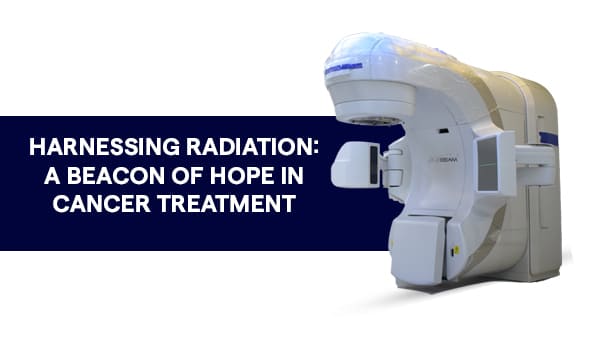
Understanding Radiation Therapy:
Radiation therapy, also known as radiotherapy, utilizes high-energy Radiation to eradicate cancer by damaging the DNA of the cancer cells. Radiotherapy is delivered externally or internally, depending on the type and stage of cancer. External beam radiation involves directing Radiation from a machine outside the body toward the cancer site. In contrast, internal radiation therapy, or brachytherapy, involves placing radioactive sources directly into the area or near the tumor.
Precision and Personalization:
One of the most important advancements in radiation therapy is the development of precision and personalized radiotherapy. With cutting-edge technologies like Intensity-Modulated Radiation Therapy (IMRT), Image-Guided Radiation Therapy (IGRT), and Stereotactic Body Radiation Therapy (SBRT), oncologists can precisely target tumors with minimal damage to surrounding healthy tissue. This precision not only enhances treatment efficacy but also reduces side effects, improving patients' quality of life during and after therapy.
Versatility in Cancer Treatment:
Radiation therapy plays a pivotal role in treating various types of cancer, and It can be used as a stand-alone curative treatment or in combination with surgery, chemotherapy, or immunotherapy, depending on the specific needs of each patient. Additionally, radiation therapy can be employed as a palliative measure to alleviate symptoms and improve quality of life.
Overcoming Challenges:
While radiation therapy offers immense promise, it has its challenges. Radiation oncologists must navigate complex treatment planning processes to ensure optimal tumor coverage while minimizing radiation exposure to healthy organs. Moreover, managing potential side effects such as fatigue, skin irritation, and long-term complications requires a multidisciplinary approach involving oncologists, nurses, and supportive care teams.
Empowering Patients:
In the journey through radiation therapy, patients are at the heart of every decision and treatment plan. Empowering patients with knowledge about their overall health condition, treatment options, & potential side effects fosters a collaborative relationship between healthcare providers & patients, ultimately leading to the best treatment outcomes and improved overall well-being.
A Brighter Future:
As research and technology continue to evolve, the future of radiation therapy looks brighter than ever. Additionally, advancements in radiobiology and immunotherapy are paving the way for novel combination therapies that harness the immune system's power to enhance the effectiveness of radiation treatment.
In conclusion, radiation therapy stands as a cornerstone of modern oncology, offering hope and healing to cancer patients worldwide from the best radiation oncology hospital in Delhi. Through precision, personalization, and perseverance, radiation oncologists and their teams continue to push the boundaries of what's possible, striving towards a future where cancer is not only treatable but conquerable. This content is provided by Dr. Shikha Halder from Sir Ganga Ram Hospital.
To know more about radiation or cancer treatment, book an appointment with Sir Ganga Ram Hospital.